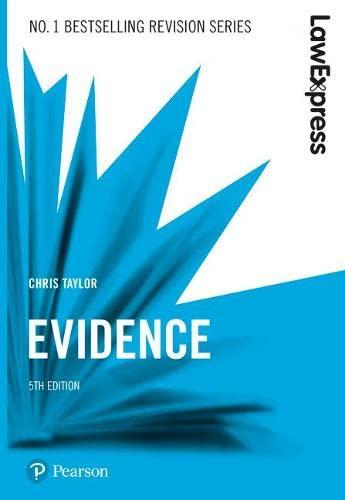Question
Rei is a buyer for a large chain of retail warehouse stores called BuyLo. Rei is in charge of negotiating the terms of purchase with
Rei is a buyer for a large chain of retail warehouse stores called BuyLo. Rei is in charge of negotiating the terms of purchase with vendors (i.e. suppliers to Buylo). Anisa is a vendor trying to get her company's product, a baby monitoring wearable bracelet called "BabeSafe", into BuyLo. Anisa and Rei have been in conversation for months as follows:
On November 1, 2020, Anisa emailed Rei a detailed description of the BabeSafe product along with preliminary pricing ideas and asked Rei for a meeting. In the email, Anisa wrote, "we were thinking of a per unit price of $85 for BuyLo, with a minimum order of 5000 units."
On November 3, 2020, Rei emailed Anisa back to say that she was interested in BabeSafe. She wrote, "I think there's a market for this. We would need to start really small though in a local test market. Nothing more than 1000 units. Could you still do $85 per unit with that volume?"
Later that day, Anisa emailed back, "That's great! Yes, of course, we could still do $85 per unit and we will do it for the 1000 units, all to be delivered in 30 days." And just to be sure she had their communications in writing, she printed her email, placed it in an envelope and mailed it to herself that very day.
The evening of Nov 3, 2020, Anisa placed an order with BabeSafe's manufacturer to start producing the 1000 units. She paid a non-refundable deposit of $40,000 to the manufacturer.
On November 4, 2020, Rei called Anisa and told her, "Actually, we just secured a deal with another company, BabyGuard, for a similar product. Maybe give me a call at this time next year, and we can see if it's a better time for us to buy your product then. It's not going to work out at this time."
1) Anisa is fuming and she is out her non-refundable deposit of $40,000 to her manufacturer. She plans to sue Rei for breach of contract. Will she be successful? Explain fully with reference to relevant legal principles and cases studied. (10 Marks, Approximately 10 Minutes)
2) BuyLo signed a contract with BabyGuard for the supply of 1000 "infant-sized bracelet wearables" that measure the vitals of a baby. As part of BabyGuard's pitch to BuyLo, it had quoted a market size of roughly 1 million 0-2 year olds in Canada. When Rei received delivery of BabyGuard's products, she was shocked. The bracelet wearables were tiny and would only fit babies up to 8 months of age. Rei called the sales representative at BabyGuard and said, "this is not what we contracted for. We needed bracelet wearables that would fit babies up to 18 months." The sales representative replied, "the word "infant" only refers to babies up to 8 months. After that, the salesperson contended, the child is no longer an "infant". The sales representative finally stated "Rei, you wrote the contract, you could have specified the age in months!". The dictionary definition of infant is "a child in its earliest stage of life." Rei wants to return the products for a full refund. BabyGuard refuses.
What process would a court use to interpret the term "infant"? Explain fully with reference to relevant legal principles and cases studied.
Step by Step Solution
There are 3 Steps involved in it
Step: 1

Get Instant Access to Expert-Tailored Solutions
See step-by-step solutions with expert insights and AI powered tools for academic success
Step: 2

Step: 3

Ace Your Homework with AI
Get the answers you need in no time with our AI-driven, step-by-step assistance
Get Started


